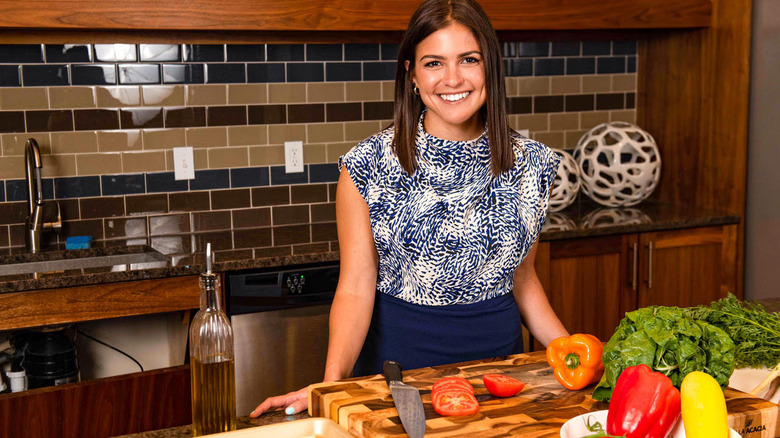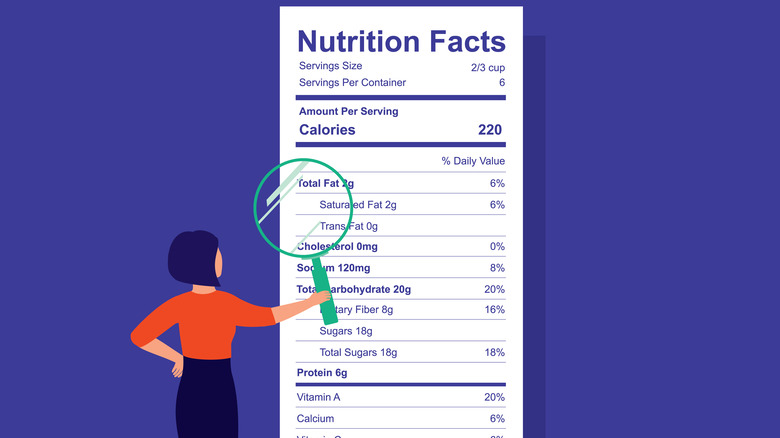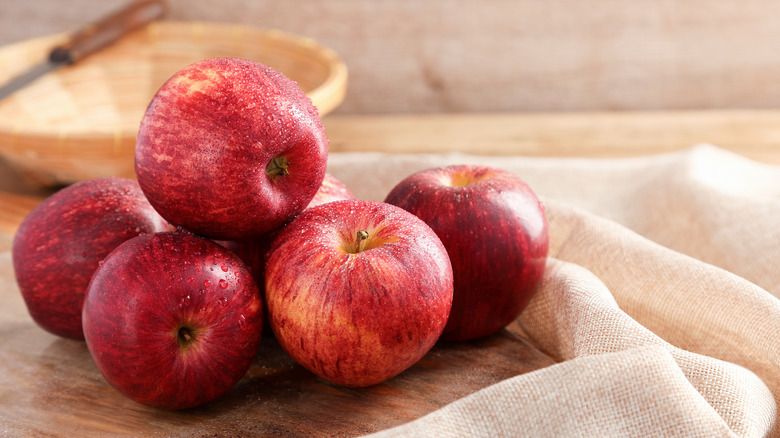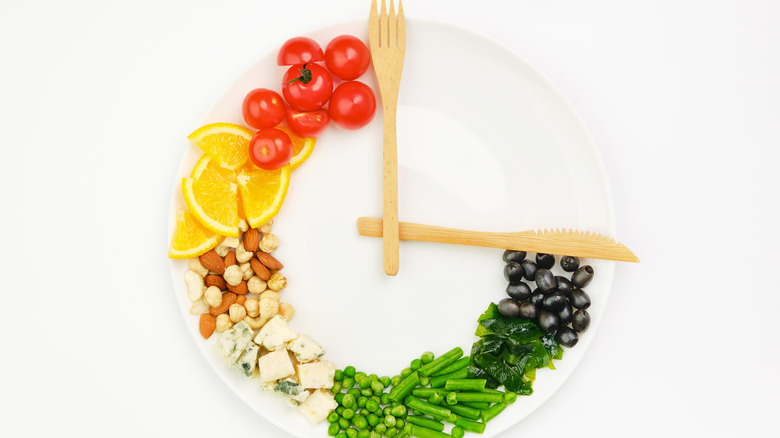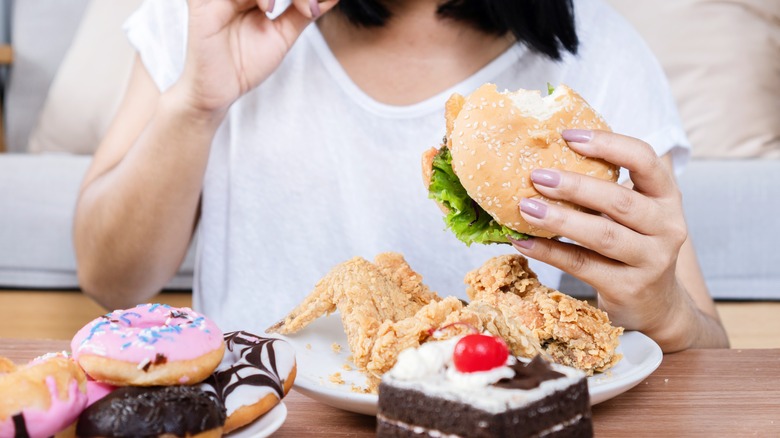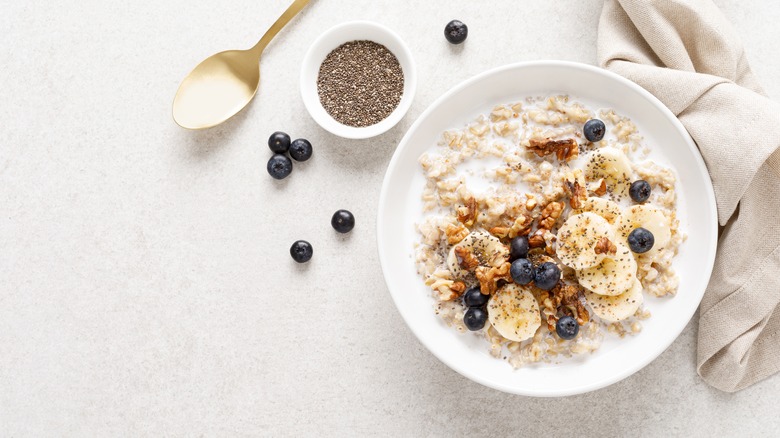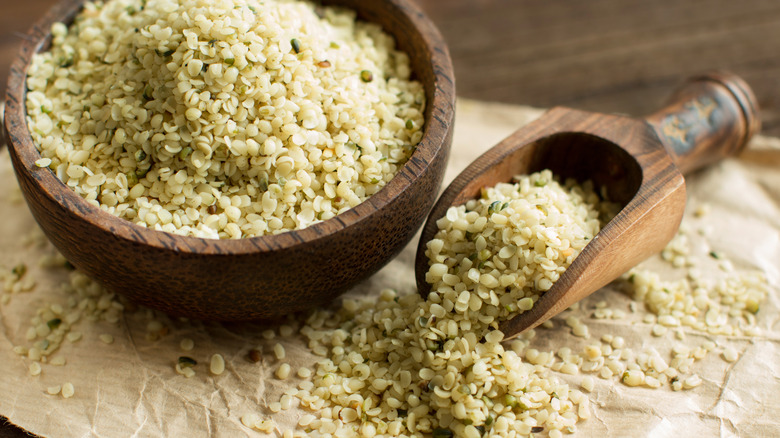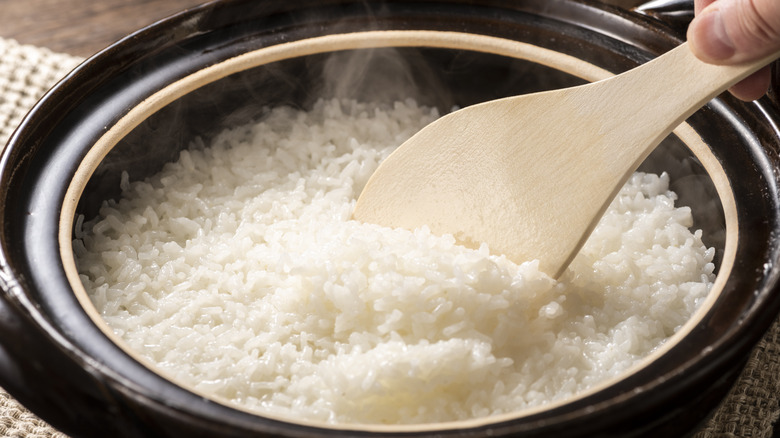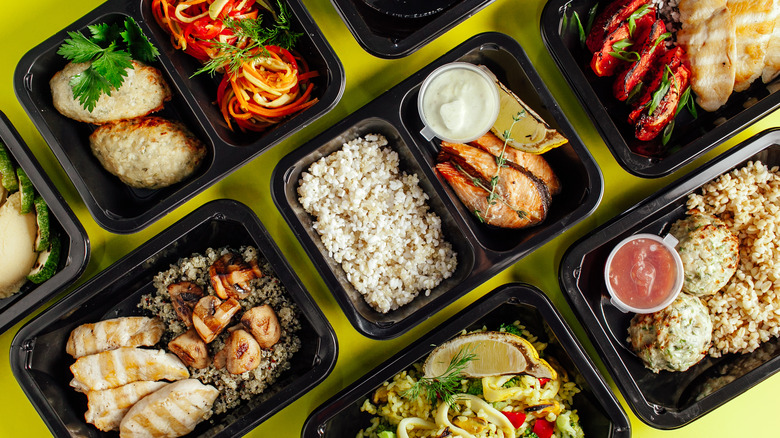TikTok Dietitian Stephanie Grasso Gives Her Best Healthy Eating Tips - Exclusive Interview
Social media always has nutrition facts and figures swirling around, so it can be difficult to decipher food dos and don'ts. But who better to give you food advice than a dietitian? Enter "your TikTok dietitian" Stephanie Grasso. She has accumulated 2.1 million followers and 27.7 million likes to date as she promotes balance in eating rather than restriction — this is where the saying "work smarter, not harder" comes into play.
In an exclusive interview with Health Digest, Grasso answered some of the most-asked questions on how to change your lifestyle to promote a healthy diet. The registered dietitian revealed how she really feels about intermittent fasting, what you should look for on a nutrition label, and the internet nutrition myths you should avoid. Be prepared to take notes — especially when it comes to her meal-prepping tips and tricks. Have you ever wondered how to make a pasta dish more well-balanced? Well, Grasso has the solution for that too.
How to keep a balanced diet during the holidays
With the holiday season already here, and all of the sweets and delicious foods that come with that, how do you recommend finding a balanced diet during this time of year?
There's a few steps to take. My tip is to bring a nutritious dish or a veggie when there's a big family celebration going on to ensure that you have some type of nutrition at that household when you're not in charge. There's a lot of calorie-dense foods, and it's very important to balance throughout the day.
I'm not telling you at the party, "Eat your salad and avoid all those cookies and pies." No. You want to be present and enjoy that moment, but maybe you know you're going to be eating pretty high-caloric foods in the evening, so maybe for breakfast and lunch, you want to incorporate more veggies there. Have a veggie omelet and something lighter during the day at lunchtime — maybe a salad with lean protein on top — so that way, you won't feel as bad at nighttime when you're celebrating with your friends with all the goodies.
That's a good call. A lot of people are like, "I'll skip breakfast and lunch and wait to eat."
That's a huge no-no. Even my family is guilty of that, especially Thanksgiving. They're like, "All right. We're not going to have breakfast. We're going to fast until our feast."
That's actually not good, because when we're fasting throughout the day and it comes to that big dinner, we're more likely to over-indulge and overeat and feel more stuffed than satisfied. It's very important to have those regular mealtimes and to regulate blood sugar so we're feeling good throughout the day. Then, when it comes to that mealtime, we're going to practice more mindful eating rather than going all at it.
What to look for in a nutrition label
When looking at a nutrition label, I often search for the calories first. What should I be looking for?
Calories are a good place to start, which is nice with the label, because they made a few changes with that. They made the calories a lot bigger. But food is a lot more than calories; it's a lot more than numbers. I like to look at the nutrition aspect of it. The next thing I like to look at is the protein — the carb and protein ratio. I want to see a lot of fiber if it's a high-carb food. Added fiber helps you stay full. It's really good for the gut.
I also look at protein. Protein is going to make you feel satisfied throughout the day and regulate your blood sugars. What's very important with the food label ... A lot of people don't know this, but before taking nutrition classes, I had no idea what those numbers meant. I don't know what six grams of protein is — is that high or low? But what's important is if you look at the percent daily value that's on the right side.
That's very important, and that'll tell you whether that food is high or low in nutrients. Anything that's 20% or higher is considered high. Anything 5% or lower is considered low. The nutrients you want to get more of, or the high daily value, is going to be your protein, the vitamins, the minerals, and the monounsaturated fats. [For] the lower percent daily value, we want to limit our saturated fats [and] our sodium.
You should plan your meals on a Friday
I saw on TikTok that your favorite hummus pairing went viral. What would your go-to snack be and why? What's your favorite?
I'm always a yogurt gal with yogurt and apples, but I like to pair it with some type of fat, so I usually grab a Kind bar with that. That way, it's a perfectly balanced snack where you have the carbs coming from an apple, the protein coming from the yogurt, and your fats coming from the Kind bar. That will hold me over for two hours until the next mealtime. It's very convenient.
If you could give one tip for meal prepping, what would it be?
How I meal prep is I tend to actually do it on a Friday. That's because it's the end of the week — we're still in work mode. A lot of people meal prep on Sunday. For me, that's hard because I want to relax, so Friday is when I plan for next week's meals.
I pick around three to four dinners, and I do that by searching Pinterest, TikTok, and Google. From there, I write down all the ingredients, and I look at the ingredients and see what I can mix and match. If one ingredient says rice and another one says couscous, I can definitely use the same ingredient — maybe rice for both or couscous for both — because that's more budget-friendly and a lot easier.
After that, I cut down the ingredients. I see what I already have in the pantry, and I condense my grocery list. I do that all on Friday. When it comes to Saturday, I usually go to the grocery store and get all the stuff. There's not a lot of people on a Saturday at a grocery store because everybody's out and about, so that's my favorite time to go.
Intermittent fasting isn't worth the hype
Stephanie Grasso (continued): Sunday is when I do all the meal prepping. I'm not the type of person who prepares meals where you have those containers and everything looks the same, like the chicken and the rice and the grain — that's not appealing to me at all. When it comes to meal prepping, I prepare things that are going to help me during the week that take a long time.
Grains are usually my favorite food to meal prep on a Sunday, because they hold over for the week, and they usually take the longest to make. I'll prep probably one grain, whether it's rice, couscous, or farro, and have a big bowl ready to go in the fridge. At nighttime when I come home from work, or if I'm tired, it's all ready to go. And protein — sometimes I will meal prep if I'm having chicken on Monday or Tuesday, but usually, that's the only food I cook the night of.
[With] fruits and veggies, I love cutting them up on a Sunday, especially if I need a snack. I usually have some red peppers — I cut them into little small strips and have them in a container in the fridge next to hummus. It's all ready to go. I know when I get a pineapple and it's not cut, I will never do it during the week. I don't like it. It's best to cut it all and it's ready to go, and it's more appetizing that way.
We talked about fasting a little bit, but how do you feel about intermittent fasting? Do you think it's worth the hype?
I am pretty against intermittent fasting, and I don't think it's worth the hype. Overall, when it comes to fasting, you're cutting out mealtimes, so you're restricting calories. If you're fasting to lose weight, yes, it might help because you're skipping breakfast and lunch, but that's not a sustainable lifestyle to live. You're more likely to be more hangry and you're less productive because you're not having regular mealtimes. You're not having the carbohydrates in the morning that give you energy. I'm not a fan of it.
Grasso's advice for binge eating
I'm not a fan of fasting either. I've never even tried because I feel like it isn't worth it and I'd end up binge eating.
Exactly. That's the thing. The more you restrict throughout the day ... I always think of this as a pendulum, so the more you restrict breakfast and lunch, the more you're going to compensate that with your body and you're going to overindulge at nighttime. You're more likely to binge on more snacks and desserts right before bed, and that might affect your sleep.
Do you have any advice for people who may struggle with binge eating?
Number one is ... be easy on yourself. There's so much out in the media where nutrition is so confusing that you don't know what to do, and it's overwhelming. You've got to cut yourself some slack. The more you eat and the more you accept foods into your diet, the better relationship you're going to have with food. You're not going to overthink about that food, and you're less likely to binge on it.
Whether it's small, frequent meals throughout the day [or] slowly incorporating more foods, changing your mindset around food is very important, focusing on the health aspects and the health benefits of food. "I'm going to add some red peppers to this meal so I can get more fiber." Changing your mindset to that is very helpful.
Don't believe that oatmeal myth
There are a lot of diet fads and food myths going around, especially on social media. What are some of the biggest myths and misconceptions that are prevalent in nutrition right now? What should people be avoiding?
Oh, my goodness, I know. I'm trying to think of my TikTok feed — I'm honestly seeing [fewer and fewer] fads and myths, which is great, unless my feed dropped off, because I can't stand it. But a big trend I'm seeing right now is that people are saying oatmeal is bad for you.
In 2020 and 2021, carbs were the biggest thing. People kept saying, "You need to cut that out because that's going to spike your blood sugar." I felt like we defeated that myth, us dietitians, on TikTok, because carbs are great for us. It gives us energy. But now we're coming to oatmeal, and people are saying that's bad for you because it causes insulin resistance and makes you gain weight. I don't know who started that, but that's actually not true. Oatmeal is really good for you.
First of all, it gives you all that energy, but it doesn't spike your blood sugar because it has a lot of fiber in there. That slows the absorption of carbs into your bloodstream, giving you sustainable energy levels. With that, if you add some type of protein — I like to add some peanut butter or granola, adding more fiber to it — that's going to slow that absorption down and not spike your blood sugar. People make food sound scary when it's not. It's the opposite, and it's so good for you.
I went through a phase where I don't know why all of these food tips were coming up, but they were like, "This is bad for you and that is bad for you." I'm like, "Okay, so what am I supposed to eat, ever?"
Exactly. Foods have no morals. There's no such thing as good or bad food. They're just different. They have different nutrition components.
Add more fiber to your diet
On TikTok, there are a lot of videos on how to fix your gut health and recommendations ranging from morning greens to completely cutting out dairy and carbs. What is your opinion on this as a whole?
I'm not a gut health expert or a gut health dietician, because there are dietitians that do specialize in it. I do believe foods support your gut, and that's including fiber and probiotics. I actually don't eat a lot of foods containing live culture, especially kimchi or yogurt. Well, no — I have a lot of yogurt, but [not] kimchi, apple cider vinegar, and kombucha.
I'll take a probiotic for that. That helps, [as well as] eating regular meals. We were talking about fasting; that can affect your metabolism and slow it down. Having regular meals is really good for your gut health.
You mentioned fiber a few times. How would you recommend using chia seeds and flax seeds? Is that something you would recommend using?
Yes. It's funny because I always have hemp seeds with me, which are kind of like chia seeds, but [they] actually have more healthy fats and a lot of fiber. I always have that in my little [container] by my desk. I'll throw it into a smoothie or oatmeal. You can put it in soups, actually. You can put it on top of pasta, which is good, and in salad. It has no flavor, but chia seeds are a little different. I wouldn't put it on your pasta, but hemp is totally fine in pasta.
Should you eat white or brown rice?
I've also seen that white rice is healthier than brown rice quite a few times. Do you agree with this? Why or why not?
I haven't heard that one, but it's interesting. I wouldn't say one is healthier than the other; they're just a little bit different. Brown rice is a whole grain, and white rice is a refined grain. They're the same thing, but with brown rice, they have what's called the shell, and that's the fiber. When brown rice is processed into white rice, they basically strip out that outer shell, and you're left with the endosperm, which is a carbohydrate, and then a little germ, which has some nutrition.
The difference is the fiber component between the two. I love both of them. I love the taste and the texture of white rice more than brown rice, but if I'm not having enough fiber during that day, I might choose brown rice. That goes with the protein.
How would you upgrade a pasta dish to be more well-rounded?
With any meal, I always want to make sure it has carbs, protein, fats, and vegetables. With pasta, we already have carbohydrates. My next thing is, "I want to add some protein so I can feel full and satisfied. What will go well with pasta?" I love shrimp and pasta, so I would add shrimp, or you can dice up some chicken and throw it in there.
The next thing I think of is, "We need to add some color." I always have my little three-color plate rule, because that ensures you're getting a variety of nutrients. Each color means that there's different nutrients in that food. I would think, "Hmm. This is pretty white, so I'm going to add some green — maybe some broccoli — and red peppers for red, and throw that in there."
A bonus point is trying to get some healthy fats in there. That can be sometimes limited because you have fish, olive oil, seeds. There's not as much variety compared to your carbs and protein. But for a pasta dish, you can add some olive oil to it. You can even replace the chicken with salmon because you're getting the best of both worlds, the healthy fats and protein. That's usually my mindset when it comes to building a balanced plate, hitting those components.
How to create a healthy relationship with food
It can be a constant struggle for a lot of people to gain or maintain a healthy relationship with food. What would your advice be in general for these types of people?
That's a good question. First, unfollow anybody on social media that makes you feel uncomfortable or bad about food, because that's the number one trigger when it comes to an unhealthy relationship with food. I used to have a horrible relationship with food before becoming a dietician, and it's because of social media. It's how our society sets the bar of how we should look and how we should eat. You want to get rid of all that toxicity in your life. That's step one.
Step two, follow dietitians, because they will tell you the straight-up facts about nutrition and how it's not scary. Step three is slowly accepting foods that you're scared of and slowly bringing that back into your diet. Once you do, your mind's going to stop thinking about it as much as it did before. When you restrict things, you tend to think about it more, but when you start to accept it and bring it back, your mind doesn't obsess about it anymore.
Do you have any upcoming projects or anything else exciting coming up that you would be able to share?
Hopefully, 2023 is going to be the start of a new podcast that I am going to be targeting around health and nutrition. That's going to be exciting.
Are you going to have a co-host for that, or is that just going to be you? What's the plan?
I'm planning on interviewing guests and health professionals and digging into the facts about overall wellness — and cutting the BS that we see on social media.
Do you have a name for it yet?
Not yet. It's all in the planning process right now, and hopefully, we get started this coming year.
Check out Stephanie Grasso's TikTok or Instagram page to keep up with her latest videos.
This interview has been edited for clarity.


